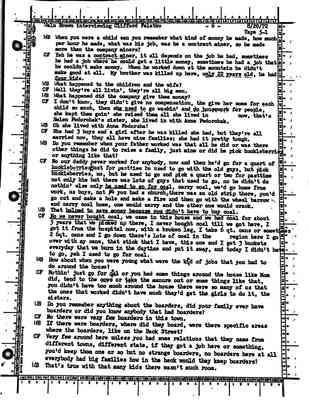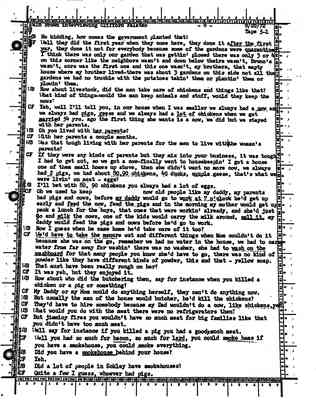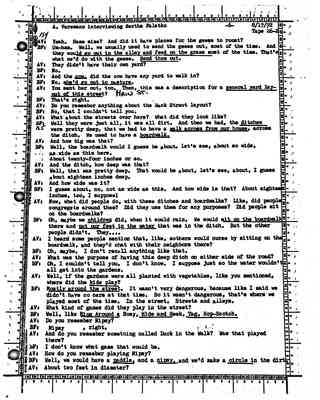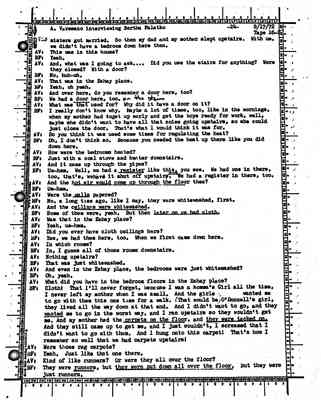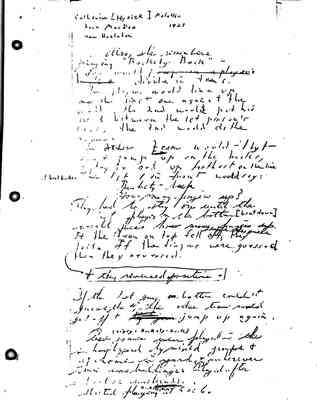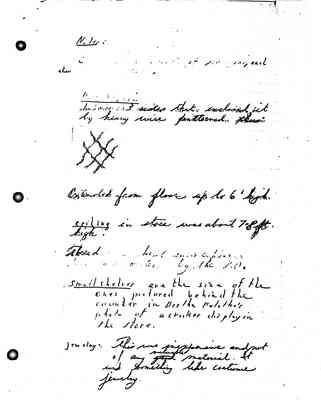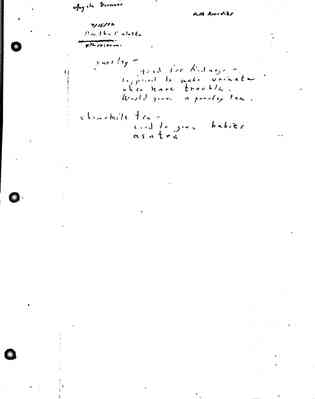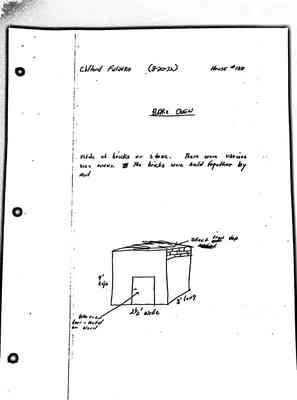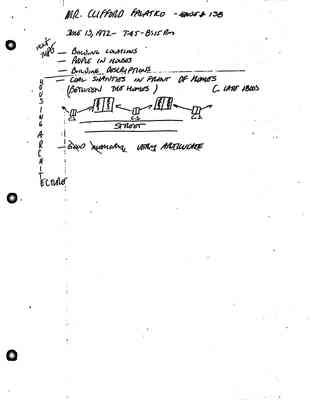Pages That Need Review
Vol. 1-Interview-Falatko
page_0008
Waln Brown interviewing Clifford Falatko -6- 8/20/72 Tape 5-1 WB When you were a child can you remember what kind of money he made, how much per hour he made, what was his job, was he a contract miner, so he made more than the company miners? CF Yeh he was contract miner, it all depends on the job he had, sometimes he had a job where he could get a little money, sometimes he had a job that he couldn't make money. When he worked down at the mountain he didn't make good at all. My brother was killed up here, only 22 years old, he had four kids. WB What happened to the children and the wife? CF Well they're all livin', they're all big men. WB What happened did the company give them money? CF I don't know, they didn't give no compensation, the give her some for each child so much, then she used to go washin' and do housework for people, she kept them goin' she raised them all she lived in ( ) now, that's Helen Fedorchak's sister, she lived in with Anna Fedorchak. WB Oh she lived with Anna Fedorsha? CF She had 3 boys and a girl after he was killed she had, but they're all married now, they all have nice families; she had it pretty tough. WB Do you remember when your father worked was that all he did or was there other things he did to raise a family, just mine or did he pick huckleberries or anything like that? CF No our daddy never worked for anybody, now and then he'd go for a quart of huckleberries just for pasttime he used to go with the old guys, but pick huckleberries, no, but he used to go and pick a quart or two for pasttime not only him but there was lots of guys that used to go, no he didn't do nothin' else only he used to go for coal, carry coal, we'd go home from work, us boys, not #4 you had a church, there was an old strip there, you'd go out and make a hole and make a fire and then go with the wheel barrow and carry coal home, one would carry and the other one would crack. WB That helped to save money because you didn't have to buy coal. CF No we never bought coal, we came in this house and we had coal for about 5 years that we picked up there, I never bought coal till we got here, I got it from the hospital now, with a broken leg, I take 6 qts. cans or sometime 2 6qts. cans and I go down there's lots of coal in the ( ) region here I go over with my cane, that stick that I have, this one and I get 3 buckets everyday that we burn in the daytime and put it away, and today I didn't have to go, yeh I used to go for coal. WB How about when you were young what were the kind of jobs that you had to do around the house? CF Nothin' just go for coal or you had some things around the house like Mom did, tend to the cows or take the manure out of some things like that, you didn't have to much around the house there were so many of us that the ones that worked didn't have much they'd get the girls to do it, the sisters. WB Do you remember anything about the boarders, did your family ever have boarders or did you know anybody that had boarders? CF No there were very few boarders in this town. WB If there were boarders, where did they board, were there specific areas where the boarders, like on the Back Street? CF Very few around here unless you had some relations that they came from different towns, different state, if they got a job here or something, you'd keep them one or so but no strange boarders, no boarders here at all everybody had big families how in the heck would they keep boarders? WB That's true with the many kids there wasn't much room.
page_0009
Waln Brown interviewing Clifford Falatko -7- 8/20/72 Tape 5-1 CF Very few that had boarders in them days my mother would have to keep the boarders on top of us yet. WB In your family that's the truth with that many children. Did you get caught up in the strikes here, there were 2 strikes in Eckley weren't there? CF Sure there were strikes. WB What happened when there were strikes, and the men weren't working what did they do to make some money? CF Well nothin' what could you do, there was nothin' to do only go for coal but you weren't allowed to go for coal no palce, just cops, guards watchin' around the breakers with where there were slopes they were fenced and they had guards the company had, you wasn't allowed to go close to the mines during the strike. WB Was that the Coal and Iron Police? CF Yeh, yeh, yeh. WB And they had a fance all around the mines and CF Mostly, especially around the breaker here the ( ) all around. WB And what happened if they caught somebody? CF I guess they'd have you arrested, I don't remember that. WB I just wondered if any of them beat up any people, like that or shot any one? CF No it wasn't that wild around here, they was no niggers or strange people they were mostly, in town they said there were, no matter what kind they were Polish, Slavish, Greek or Dutch and Irish ( ) like one family they were all workin' together. WB I was talking about the Coal and Iron Police they didn't bother nobody if someone saw that someone was taking some coal, what would they do, would they throw them in jail? CF I don't think so, I don't remember that, they never done that. WB Did they have many police here while the strike was on? CF Not many, now and then they had especially around the slope that was goin' in the mine, if they were going in the mines to do some damage, dynamite or somethin' but not much outside. WB Maybe 5 or 6 of them in the whole town? CF There were some at the slope here. WB So they'd keep a man or two at each slope so no one could get down in there and do anything, but didn't some of the men do something to make some money if it was a 6 month strike? CF Well some of then was old enough that they could go in the woods and pick huckleberries and then how long does huckleberries last, that's all they could do mostly they couldn't do nothin' else. WB Didn't some of the men go and work for the farmers around here? CF I don't remember, maybe some, I don't think so. WB I guess the men mostly loafed around the house. CF That's all, playin' cards and shootin' these, whether it was a 6 month strike a 4 month or a 2 month strike no matter how long it last, they didn't do nothin' WB I guess they got on their wives nerves? CF THe wives had to help anyhow, no there wasn't too much trouble. WB Were there certain chores the men had, like did they do anything with the gardening or was that all the children that worked in the gardens? CF No the old man used to go, they helped, they dug the gardens. Remeber everybody had gardens planted not like we had no grass no place, you could pick it with one fist, all everything's planted when we came here in the house 17 yrs. no 15 yrs ago, well this garden from this shanty up to this house was in the back the government planted potatoes the whole garden was planted with potatoes we didn't touch it, we didn't plant it we didn't plow it we didn't dig them, the government guys dug them out and spill them on a pile for us we didn't have to do a thing.
page_0010
Waln Brown interviewing Clifford Falatko -8- 8/20/72 Tape 5-1 WB No kidding, how come the goverment planted that? CF Well they did the first year when they come here, they done it after the first war, they done it not for everybody because some of the gardens were quarantined I think there was only our grarden that was gettin' plowed there was only 3 or 4 on this corner like the neighbors wasn't and down below theirs wasn't, Bruno's wasn't, ours was the first one and this one wasn't, my brothers, that empty house where my brother lived-there was about 3 gardens on this side not all the gardens we had no trouble with the potatoes takin' them or plantin' them or plowin' them. WB How about livestock, did the man take care of the chickens and things like that? What kind of things- would the man keep animals and stuff, would they keep the cows? CF Yeh, well I'll tell you, in our house when I was smaller we always had a cow and we always had pigs, geese and we always had a lot of chickens when we got married 54 yrs. ago the first thing she wants is a cow, we did but we stayed with her parents. WB Oh you lived with her parents? CF With her parents a couple months. WB Was that tough living with her parents for the men to live with the woman's parents? CF If they were any kinds of parents but they mix into your business, it was tough I had to get out, so we got a cow- finally went to housekeepin' I got a house one of them small houses up above, then she didn't want no more cow, we always had 2 pigs, we had about 80-90 chickens, 40 ducks, couple geese, that's what we were livin' on meat- eggs WB I'll bet with 80 -90 chickens you always had a lot of eggs. CF Oh we used to keep now old people like my daddy, my parents had pigs and cows, before my daddy would go to work at 7 o'clock he'd get up early and feed the cow feed the pigs and in the mornig my mother would get up pack a lunch for the boys, ones that were workin' already and she'd just go and milk the cows, one of the kids would carry the milk around, sell it, my daddy would feed the pigs and cows before he'd go to work. WB Now I guess when he came home he'd take care of it too? CF We'd have to take the manure out and different things when Mom couldn't do it because she was on the go, remember we had no water in the house, we had to carry water from far away fo washin' there was no washer, she had to wash on the washboard for that many people you know she'd have to go, there was no kind of powder like they have different kinds of powder, this and that- yellow soap. WB That must have been really rough on her? CF It was yeh, but they enjoyed it. WB How about who did the butchering then, say for instance when you killed a chicken or a pig or something? CF My daddy or my Mom could do it herself, they can't do anything now. WB But usually the man of the house would butcher, he'd kill the chickens? CF They'd have to hire somebody because my Dad wouldn't do a cow, like chickens, yeh WB What would you do with the meat there were no refrigerators then? CF But jimminy fires you wouldn't have so much meat for big families like that you didn't have too much meat. WB Well say for instance if you killed a pig you had a good, much meat, CF Well you had so much for bacon, so much for lard, you could smoke hams if you had a smokehouse, you could smoke everything. WB Did you have a smokehouse behind your house? CF Yeh WB Did a lot of people in Eckley have smokehouses? CF Quite a few I guess, whoever had pigs.
page_0027
A. Varesano interviewing Bertha Falatko
AV: Yeah. Same size? And did it have places for the geese to roost? BF: Um-hmm. Well, we usually used to send the geese out, most of the time. And they would go out in the alley and feed on the grass most of the time. That’s what we’d do with the geese. Send them out. AV: They didn’t have their own yard? BF: No. AV: And the cow, did the cow have any yard to walk in? BF: No, she’d go out to pasture. AV: You set her out, too. Then this was a description for a general yard layout of this street? [written Main ST.] BF: That’s right. AV: Do you remember anything about the Back Street layout? BF: No, that I couldn’t tell you. AV: What about the streets over here? What did they look like? BF: Well they were just all, it was all dirt. And then we had, the ditches were pretty deep, that we had to have a walk across from our house, across the ditch. We used to have a boardwalk. AV: And how big was that? BF: Well, the boardwalk would I guess be about, let’s see, about so wide, as wide as this here. About twenty-four inches or so. AV: And the ditch, how deep was that? BF: Well, that was pretty deep. That would be about, let’s see, about I guess about eighteen inches deep. AV: And how wide was it? BF: I guess about, no, not as wide as this. And how wide is that? About eighteen inches, too, I suppose! AV: Now, what did people do, with these ditches and boardwalks? Like, did people congregate around them? Did they use them for any purposes? Did people sit on the boardwalks? BF: Oh, maybe we children did, when it would rain. We would sit on the boardwalk there and put our feet in the water that was in the ditch. But the other people didn’t. They…. AV: I heard some people mention that, like, mother, would nurse by sitting on the boardwalk, and they’d chat with their neighbors there? BF: Oh, maybe. I don’t recall anything like that. AV: What was the purpose of having this deep ditch on either side of the road? BF: Oh, I couldn’t tell you. I don’t know. I suppose just so the water wouldn’t all get into the gardens. AV: Well, if the gardens were all planted with vegetables, like you mentioned, where did the kids play? BF: Mostly around the street. It wasn’t very dangerous, because like I said we didn’t have no cars at that time. So it wasn’t dangerous, that’s where we played most of the time. In the streets. Streets and alleys. AV: What kind of games did they play in the streets? BF: Well, like Ring around a Rosy, Hide and Seek, Tag, Hop-Scotch. AV: Do you remember Nipsy? BF: Nipsy [blank space], right. AV: And do you remember something called Duck in the Walk? Was that played there? BF: I don't know what game that would be. AV: How do you remember playing Nipsy? BF: Well, we would have a paddle, and a nipsy, and we’d made a circle in the dirt. AV: About two feet in diameter?
page_0045
A. Varesano interviewing Bertha Falatko
sisters got married. So then my dad and my mother slept upstairs. With us, we didn't have a bedroom down here then. AV: This was in this house? BF: Yeah. AV: And, what was I going to ask.... Did you use the stairs for anything? Were they closed? With a door? BF: No, huh-uh. AV: That was in the Zahay place. BF: Yeah, oh yeah. AV: And over here, do you remember a door here, too? BF: We had a door here, too. [on the stairs] AV: What was that used for? Why did it have a door on it? BF: I really don't know why. Maybe a lot of times, too, like in the mornings, when my mother had to get up early and get the boys ready for work, well, maybe she didn't want to have all that noise going upstairs, so she could just close the door. That's what I would think it was for. AV: Do you think it was used some times for regulating the heat? BF: Oh, I don't think so. Because you needed the heat up there like you did down here. AV: How were the bedrooms heated? BF: Just with a coal stove and heater downstairs. AV: And it came up through the pipes? BF: Um-hmm. Well, we had a register like this, you see. We had one in there, too, that's we have it shut off upstairs/now. We had a register in there, too. AV: And the hot air would come up through the floor then? BF: Um-hmm. AV: Were the walls papered? BF: No, a long time ago, like I say, they were whitewashed, first. AV: And the ceilings were whitewashed. BF: Some of them were, yeah. But then later on we had cloth. AV: Was that in the Zahay place? BF: Yeah, um-hmm. AV: Did you ever have cloth ceilings here? BF: Yes, we had them here, too. When we first came down here. AV: In which rooms? BF: In, I guess all of those rooms downstairs. AV: Nothing upstairs? BF: That was just whitewashed. AV: And even in the Zahay place, the bedrooms were just whitewashed? BF: Oh, yeah. AV: What did you have in the bedroom floors in the Zahay place? BF: Cloth! That I'll never forget, because I was a Momma's Girl all the time, I never left my mother when I was small. And the girls, xxxx wanted me to go with them this one time for a walk. (That would be O"Donnell's girl), they lived all the way down at that end. And I didn't want to go, and they wanted me to go. in the worst way, and I ran upstairs so they wouldn't get me. And my mother had the carpets on the floor, and they were tacked on. And they still came up to get me, and I just wouldn't, I screamed that I didn't want to go with them. And I hung on to this carpet! That's how I remember so well that we had carpets upstairs! AV: Were those rag carpets? BF: Yeah. Just like that one there. AV: Kind of like runners? Or were they all over the floor? BF: They were runners, but they were put down all over the floor. But they were just runners.
page_0053
now Hazelton
???? she remembers playing "Rockety Bock" - ???? would ??????????? players ????? divide in teams ????? players would line up ????? the first one against the wall the 2nd would put his ???? between the 1st person ????? the 2nd would do the ???? the other team would -????- ???? + jump up on the backs, ? ???? ?? get up ferthest on the line The first in front would say: Rockety Bock How many fingers up? They had to stay on until the it player on the botton {bentdown} ???? ???? how many fingers up If the one on top fell off, they ????. If the ding one were goessed then they reversed. ----------------------------------- + they reversed positions.
page_0057
A drawing
Notes:
?????????} sides that enclosed it by heavy wire ?????????
Extended from floor up to 6' high.
ceiling in store was about 7-8 ft high
Thread ??????????????????????????? ????????????????????? by the P.O.
page_0058
Angela Varenno Folk reading 7/15/72 Bertha Falatko
9:30-10:00 a.m.
Parsley - good for kidneys - supposed to make urinate when have trouble would give a parsley tea.
chamomile teaused to give babies as a tea
page_0061
Drawing
Clifford Falatko (8-20-72) House #138
Bake Oven _________
Made of bricks or stone. There were various size ovens. The bricks were held together by mud
Sheet iron top
4' high
2 1/2' wide 3'long
Bake oven dooe - metal on wood
page_0062
Drawing
Mr. Clifford Falatko - House # 138 June 13, 1972 - 7:45-8:15 Pm
Don't type - Building Locations - People in Houses - Building Descriptions
H - Coal Shanties in Front of Homes O (Between the Homes) C. late 1800s U S R R R R I E E E E N S S S S G CS CS CS A ________________________ R Street C _______________________ H I -GOOD ??? Very ART???? T ECT???
